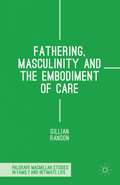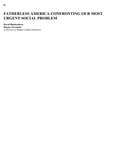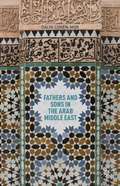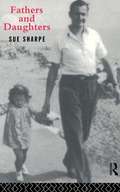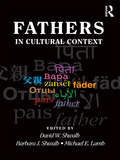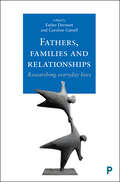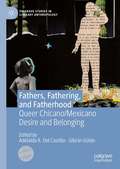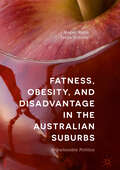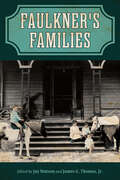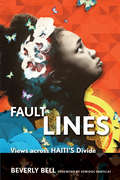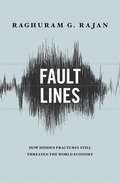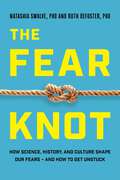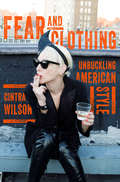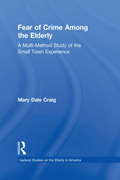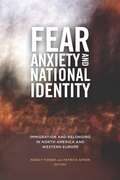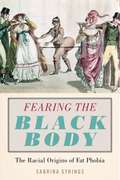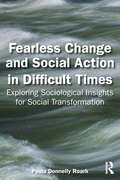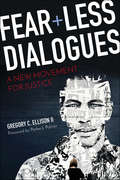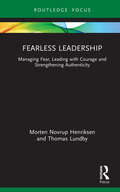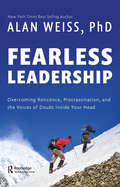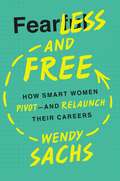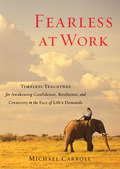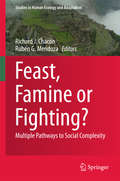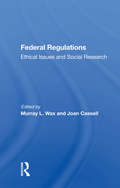- Table View
- List View
Fathering, Masculinity and the Embodiment of Care (Palgrave Macmillan Studies in Family and Intimate Life)
by Gillian RansonMany fathers are now providing hands-on, engaged care to babies and young children. This book draws on observations of, and interviews with, caregiving fathers, as well as analyses of fathers' memoirs and online blogs, to examine fathers' caregiving work as embodied practice and as lived experience.
Fatherless America: Confronting Our Most Urgent Social Problem
by David Blankenhorn"[A] well reasoned, empirically sound, and an important contribution to the public debate." — William J. Bennett, author of The Book of Virtues A compelling and controversial exploration of absentee fathers and their impact on the nation One of the most urgent and controversial books of the 90s, "'Fatherless in America' has instantly become a catch phrase" (Los Angeles Times). Blankenhorn defines the growing fatherlessness in America and how we can restore fathers to their rightful place in our families.
Fathers And Sons In The Arab Middle East
by Dalya Cohen-MorDrawing on insights from psychology, sociology, anthropology, religion, history, and literature, this book examines early and contemporary writings of male authors from across the Arab world to explore the traditional and evolving nature of father-son relationships in Arab families.
Fathers and Daughters (Male Orders)
by Sue SharpeFathers and Daughters explores the complex nature of this subject using the voices and experiences of both fathers and daughters. Sue Sharpe provides an examination of the important processes operating within the relationship such as those affecting gender roles, achievement, teenage sexuality, women's relationships with men and ageing. It is an original and captivating treatment of a strangely neglected subject. Sue Sharpe is a free-lance writer and researcher based in London.
Fathers in Cultural Context
by Michael E. Lamb David W. Shwalb Barbara J. ShwalbA CHOICE Outstanding Academic Title 2013! Winner, APA Division 52 Ursula Gielen Global Psychology Book Award, 2014! This new volume reviews the latest research on fathering from every continent, from cultures representing over 50% of the world’s population. International experts on 14 societies/regions discuss cultural and historical influences, variations between and within cultures, and socio economic conditions and policies that impact fathering. Contributors from several disciplines provide thought-provoking reviews of the empirical data to help us gain an understanding of fathering worldwide. Over 1,000 studies on fathering published in languages other than English are made accessible to readers around the world. The cultures were selected based on availability of substantial research on fathering; representation of worldwide geography; a balance between large, middle, and small populations; and significance for a global understanding of fathering. Each chapter features personal case stories, photos, and maps to help readers create an engaging picture for each culture. Empirical evidence is blended with the authors’ expert opinions providing a comprehensive view of what it is like to be a father in each culture. The book opens by explaining theoretical and methodological underpinnings of research on fathers. The main chapters are then organized by world regions—Asia and the Middle East, Africa, North and South America, Europe, and Australia. The conclusions chapter integrates and compares all the chapters, and makes suggestions for future research. Every chapter follows the same structure, making it easy for readers to compare fathers between cultures, or to compare chapters as a textbook:• Opening case story of one father’s life • Cultural/historical background and influences on fathers • Comprehensive review of research on fathering in that culture • Sub-cultural variations in fathering • Social/economic conditions and policies that impact fathering: divorce, never-married fathers, immigration and migration, and economic disparities • Government policies and laws relevant to fathering• Comparisons with fathers in other societies • Summary highlighting the most pertinent information presented in the chapter This thought-provoking anthology is also an ideal text for graduate or advanced undergraduate courses on child development, fathering, or family processes taught in family studies, psychology, sociology, anthropology, education, and gender/women’s studies, and ethnic studies departments. Practitioners, educators, policymakers, and researchers interested in the study of father involvement will also appreciate this book.
Fathers, Families and Relationships: Researching Everyday Lives
by Esther Dermott and Caroline GatrellIn this exciting book, leading fatherhood scholars from Europe and Scandinavia offer unique insights into how to research fathers and fatherhood in contemporary society. Outlining research methods in detail, including examples of large scale studies, online research, surveys and visual and aural methods, they explore how each approach worked in practice, what the benefits and pitfalls were, and what the wider and future application of the chosen research methods might be. Covering a wide range of subjects from non-resident fathers to father engagement in child protection, this major contribution to the field also critiques and addresses the notion that fathers, especially young fathers, can be ‘hard to reach’. Essential reading for both students and policy makers in a fast-growing area of interest.
Fathers, Fathering, and Fatherhood: Queer Chicano/Mexicano Desire and Belonging (Palgrave Studies in Literary Anthropology)
by Adelaida R. Del Castillo Gibrán GüidoBringing together a unique collection of narrative accounts based on the lived experience of queer Chicano/Mexicano sons, this book explores fathers, fathering, and fatherhood. In many ways, the contributors reveal the significance of fathering and representations of fatherhood in the context of queer male sexuality and identity across generations, cultures, class, and Mexican immigrant and Mexican American families. They further reveal how father figures—godfathers, grandfathers, and others—may nurture and express love and hope for the queer young men in their extended family. Divided into six sections, the book addresses the complexity of father-queer son relationships; family dynamics; the impact of neurodiverse mental health issues; the erotic, unsafe, and taboo qualities of desire; encounters with absent, estranged or emotionally distant fathers; and a critical analysis of father and queer son relationships in Chicano/Latino literature and film.
Fatness, Obesity, and Disadvantage in the Australian Suburbs: Unpalatable Politics
by Megan Warin Tanya ZivkovicThis ethnography takes the reader into the Australian suburbs to learn about food, eating and bodies during the highly political context of one of Australia’s largest childhood obesity interventions. While there is ample evidence about the number of people who are overweight or obese and an abundance of information about what and how to eat, obesity remains ‘a problem’ in high-income countries such as Australia. Rather than rely on common assumptions that people are making all the wrong choices, this volume reveals the challenges of ‘eating healthy’ when money is scarce and how, different versions of being fat and doing fat happen in everyday worlds of precarity. Without acknowledgement of the multiple realities of fatness and obesity, interventions will continue to have limited reach.
Faulkner's Families (Faulkner and Yoknapatawpha Series)
by Jay Watson and James G. ThomasContributions by Josephine Adams, Jeff Allred, Garry Bertholf, Maxwell Cassity, John N. Duvall, Katherine Henninger, Maude Hines, Robert Jackson, Julie Beth Napolin, Rebecca Nisetich, George Porter Thomas, Jay Watson, and Yuko YamamotoIf it seems outrageous to suggest that one of the twentieth century’s most important literary cartographers of the private recesses of consciousness is also among its great novelists of family, William Faulkner nonetheless fits the bill on both counts. Family played an outsized role in both his life and his writings, often in deeply problematic ways, surfacing across his oeuvre in a dazzling range of distorted, defamiliarized, and transgressive forms, while on other occasions serving as a crucible for crushing forces of conformity, convention, and tradition. The dozen essays featured in this collection approach Faulkner’s many families—actual and imagined—as especially revealing windows to his work and his world. Contributors explore the role of the child in Faulkner’s vision of family and regional society; sibling relations throughout the author's body of work; the extension of family networks beyond blood lineage and across racial lines; the undutiful daughters of Yoknapatawpha County; the critical power of family estrangement and subversive genealogies in Faulkner’s imagination; forms of queer and interspecies kinship; the epidemiological imagination of Faulkner’s notorious Snopes family as social contagion; the experiences of the African American families who worked on the writer’s Greenfield Farm property; and Faulkner’s role in promoting a Cold War–era ideology of “the family of man” in post–World War II Japan.
Fault Lines
by Beverly BellBeverly Bell, an activist and award-winning writer, has dedicated her life to working for democracy, women's rights, and economic justice in Haiti and elsewhere. Since the 7. 0 magnitude earthquake of January 12, 2010, that struck the island nation, killing more than a quarter-million people and leaving another two million Haitians homeless, Bell has spent much of her time in Haiti. Her new book, Fault Lines, is a searing account of the first year after the earthquake. Bell explores how strong communities and an age-old gift culture have helped Haitians survive in the wake of an unimaginable disaster, one that only compounded the preexisting social and economic distress of their society. The book examines the history that caused such astronomical destruction. It also draws in theories of resistance and social movements to scrutinize grassroots organizing for a more just and equitable country. Fault Lines offers rich perspectives rarely seen outside Haiti. Readers accompany the author through displaced persons camps, shantytowns, and rural villages, where they get a view that defies the stereotype of Haiti as a lost nation of victims. Street journals impart the author's intimate knowledge of the country, which spans thirty-five years. Fault Lines also combines excerpts of more than one hundred interviews with Haitians, historical and political analysis, and investigative journalism. Fault Lines includes twelve photos from the year following the 2010 earthquake. Bell also investigates and critiques U. S. foreign policy, emergency aid, standard development approaches, the role of nongovernmental organizations, and disaster capitalism. Woven through the text are comparisons to the crisis and cultural resistance in Bell's home city of New Orleans, when the levees broke in the wake of Hurricane Katrina. Ultimately a tale of hope, Fault Lines will give readers a new understanding of daily life, structural challenges, and collective dreams in one of the world's most complex countries.
Fault Lines: How Hidden Fractures Still Threaten the World Economy
by Raghuram G. RajanRaghuram Rajan was one of the few economists who warned of the global financial crisis before it hit. Now, as the world struggles to recover, it's tempting to blame what happened on just a few greedy bankers who took irrational risks and left the rest of us to foot the bill. In Fault Lines, Rajan argues that serious flaws in the economy are also to blame, and warns that a potentially more devastating crisis awaits us if they aren't fixed. Rajan shows how the individual choices that collectively brought about the economic meltdown--made by bankers, government officials, and ordinary homeowners--were rational responses to a flawed global financial order in which the incentives to take on risk are incredibly out of step with the dangers those risks pose. He traces the deepening fault lines in a world overly dependent on the indebted American consumer to power global economic growth and stave off global downturns. He exposes a system where America's growing inequality and thin social safety net create tremendous political pressure to encourage easy credit and keep job creation robust, no matter what the consequences to the economy's long-term health; and where the U. S. financial sector, with its skewed incentives, is the critical but unstable link between an overstimulated America and an underconsuming world. In Fault Lines, Rajan demonstrates how unequal access to education and health care in the United States puts us all in deeper financial peril, even as the economic choices of countries like Germany, Japan, and China place an undue burden on America to get its policies right. He outlines the hard choices we need to make to ensure a more stable world economy and restore lasting prosperity.
Fear Knot: How Science, History, and Culture Shape Our Fears – and How to Get Unstuck
by Ruth DeFoster Natashia SwalveWhy do we fear Halloween candy but not vending machines? Why do &“witch hunts&” recur so often in history? How dangerous are serial killers, really?The Fear Knot examines our most common deeply held fears, unpacking which are valid and which are misguided, explaining the history of how our irrational fears developed, and how we can unlearn them. We live in a world seemingly rife with danger, a villainous stranger or new deadly bacteria lurking around every corner. So how do we sort through these fears, determining which are well-founded and which have been manufactured? How can our biases and psychology allow these fears to overtake us, and how can we learn to think logically in a world driven by sensationalism?In this lively and timely tour, psychologist Natashia Swalve and journalism professor Ruth DeFoster lead readers through the history and psychology behind our most visible and sensational cultural fears, beginning with the most personal—fear within our bodies—and moving outward to the home, our country, and finally to our broadest society-level fears. From micro fears, like how our fear of vaccines has led to measles epidemics, to the broad existential dread associated with climate change and gun violence, The Fear Knot examines the toll our fears take on us, on an individual and societal level. Exploring how shared culture, media consumption, and even our own brain can help drive incorrect beliefs about risk, Swalve and DeFoster help readers to make informed, evidence-based decisions about fear and risk— and along the way, to learn how to think critically, examine your own beliefs, and become confident consumers of media and popular culture.Combining psychology and journalism in short, light-hearted chapters, The Fear Knot gives readers a fresh look at Americans&’ perceptions of risk and danger, with an emphasis on how to recognize misinformation or biases, updated to include the most recent fears that Americans face in the 21st century— and the real dangers that we may be ignoring.
Fear and Clothing: Unbuckling American Style
by Cintra WilsonAs the former New York Times Critical Shopper, and voted one of Fashionista's 50 Most Influential People in New York Fashion, Cintra Wilson knows something about clothes. And in Fear and Clothing, she imparts her no-holds-barred, totally outrageous, astute, and hilarious wisdom to the reader. Wilson reports the findings of her "fashion road trip" across the United States, a journey that took three years and ranges across the various economic "belt regions" of America: the Cotton, Rust, Bible, Sun, Frost, Corn, and Gun Belts. Acting as a kind of fashion anthropologist, she documents and decodes the sartorial sensibilities of Americans across the country. Our fashion choices, she argues, contain a riot of visual cues that tell everyone instantly who we are, where we came from, where we feel we belong, what we want, where we are going, and how we expect to be treated when we get there. With this philosophy in hand, she tackles and unpacks the meaning behind the uniforms of Washington DC politicians and their wives, the costumes of Kentucky Derby spectators, the attractive draw of the cowboy hat in Wyoming, and what she terms the "stealth wealth" of distressed clothing in Brooklyn. In this smart and rollicking book, Wilson illustrates how every closet is a declaration of the owner's politics, sexuality, class, education, hopes, and dreams. With her signature wit and utterly irreverent humor, Wilson proves that, by donning our daily costume, we create our future selves, for good or ill. Indeed: your fate hangs in your closet. Dress wisely.
Fear of Crime Among the Elderly: A Multi-Method Study of the Small Town Experience (Garland Studies on the Elderly in America)
by Mary Dale CraigFirst published in 2000. Routledge is an imprint of Taylor & Francis, an informa company.
Fear, Anxiety, and National Identity: Immigration and Belonging in North America and Western Europe
by Nancy Foner Patrick SimonFifty years of large-scale immigration has brought significant ethnic, racial, and religious diversity to North America and Western Europe, but has also prompted hostile backlashes. In Fear, Anxiety, and National Identity, a distinguished multidisciplinary group of scholars examine whether and how immigrants and their offspring have been included in the prevailing national identity in the societies where they now live and to what extent they remain perpetual foreigners in the eyes of the long-established native-born. What specific social forces in each country account for the barriers immigrants and their children face, and how do anxieties about immigrant integration and national identity differ on the two sides of the Atlantic? Western European countries such as Germany, the Netherlands, and the United Kingdom have witnessed a significant increase in Muslim immigrants, which has given rise to nativist groups that question their belonging. Contributors Thomas Faist and Christian Ulbricht discuss how German politicians have implicitly compared the purported “backward” values of Muslim immigrants with the German idea of Leitkultur, or a society that values civil liberties and human rights, reinforcing the symbolic exclusion of Muslim immigrants. Similarly, Marieke Slootman and Jan Willem Duyvendak find that in the Netherlands, the conception of citizenship has shifted to focus less on political rights and duties and more on cultural norms and values. In this context, Turkish and Moroccan Muslim immigrants face increasing pressure to adopt “Dutch” culture, yet are simultaneously portrayed as having regressive views on gender and sexuality that make them unable to assimilate. Religion is less of a barrier to immigrants’ inclusion in the United States, where instead undocumented status drives much of the political and social marginalization of immigrants. As Mary C. Waters and Philip Kasinitz note, undocumented immigrants in the United States. are ineligible for the services and freedoms that citizens take for granted and often live in fear of detention and deportation. Yet, as Irene Bloemraad points out, Americans’ conception of national identity expanded to be more inclusive of immigrants and their children with political mobilization and changes in law, institutions, and culture in the wake of the Civil Rights Movement. Canadians’ views also dramatically expanded in recent decades, with multiculturalism now an important part of their national identity, in contrast to Europeans’ fear that diversity undermines national solidarity. With immigration to North America and Western Europe a continuing reality, each region will have to confront anti-immigrant sentiments that create barriers for and threaten the inclusion of newcomers. Fear, Anxiety, and National Identity investigates the multifaceted connections among immigration, belonging, and citizenship, and provides new ways of thinking about national identity.
Fearing the Black Body: The Racial Origins of Fat Phobia
by Sabrina StringsWinner, 2020 Body and Embodiment Best Publication Award, given by the American Sociological AssociationHonorable Mention, 2020 Sociology of Sex and Gender Distinguished Book Award, given by the American Sociological AssociationHow the female body has been racialized for over two hundred years There is an obesity epidemic in this country and poor black women are particularly stigmatized as “diseased” and a burden on the public health care system. This is only the most recent incarnation of the fear of fat black women, which Sabrina Strings shows took root more than two hundred years ago.Strings weaves together an eye-opening historical narrative ranging from the Renaissance to the current moment, analyzing important works of art, newspaper and magazine articles, and scientific literature and medical journals—where fat bodies were once praised—showing that fat phobia, as it relates to black women, did not originate with medical findings, but with the Enlightenment era belief that fatness was evidence of “savagery” and racial inferiority. The author argues that the contemporary ideal of slenderness is, at its very core, racialized and racist. Indeed, it was not until the early twentieth century, when racialized attitudes against fatness were already entrenched in the culture, that the medical establishment began its crusade against obesity. An important and original work, Fearing the Black Body argues convincingly that fat phobia isn’t about health at all, but rather a means of using the body to validate race, class, and gender prejudice.
Fearing the Immigrant: Racialization and Urban Policy in Toronto
by Parastou SaberiA fascinating deep dive into one city&’s urban policy—and the anxiety over immigrants that informs it The city of Toronto is often held up as a leader in diversity and inclusion. In Fearing the Immigrant, however, Parastou Saberi argues that Toronto&’s urban policies are influenced by a territorialized and racialized security agenda—one that parallels the &“War on Terror.&” Focusing on the figure of the immigrant and so-called immigrant neighborhoods as the targets of urban policy, Saberi offers an innovative, multidisciplinary approach to the politics of racialization and the governing of alterity through space in contemporary cities.A comprehensive study of urban policymaking in Canada&’s largest city from the 1990s to the late 2010s, Fearing the Immigrant uses Toronto as a jumping-off point to understand how the nexus of development, racialization, and security works at the urban and international levels. Saberi situates urban policymaking in Toronto in relation to the dominant policies of international development and public health, counterinsurgency, and humanitarian intervention. Engaging with the genealogies and contemporary developments of major policy techniques involving mapping and policy concepts such as poverty, security, policing, development, empowerment, as well as social determinants of health, equity, and prevention, she scrutinizes the parallel ways these techniques and concepts operate in urban policy and international relations. Fearing the Immigrant ultimately asserts that the geopolitical fear of the immigrant is central to the formation of urban policy in Toronto. Rather than addressing the root causes of poverty, urban policy as it has been practiced aims to pacify the specter of urban unrest and to secure the production of a neocolonial urban order. As such, this book is an urgent call to reimagine urban policy in the name of equality and social justice.
Fearless Change and Social Action in Difficult Times: Exploring Sociological Insights for Social Transformation
by Paula Donnelly RoarkOur divided politics, unable to solve the challenges we face concerning society’s hierarchies of injustice, poverty, endless war, and climate change, are now backtracking to even more division. But the reality goes far deeper than the simple politics of left and right. For true change, we need something more profound: a culture shift, a collective change of consciousness.Fearless Change and Social Action in Difficult Times argues that culture shifts don’t just happen, they require a strong focus on social and cultural human connection which neither political nor economic power can provide alone. It is only deep participation and social integrative power which have the capacity to create these necessary cultural and societal transformations. Developing awareness in participatory groups of thought-worlds which remain out-of-sight but give cover to the implicit rules of culture and society is the first step to creating shared awareness of constructs and negative thought-worlds that subconsciously support inequality. Consciously putting aside those that are negative allows for the emergence of new positive realities and social movements. Thus, the real revolution is of the mind. It does take courage, but this is the process by which better futures are created.Offering significant contributions to sociology and social theory, this book promotes an understanding that societal change is rooted in social power and cultural shifts. Inclusive in its presentation, students, professors, NGO professionals, volunteers, activists, and interested observers will find this book of high interest.
Fearless Dialogues: A New Movement For Justice
by Gregory C. Ellison IIDrawing on all the community's collective voices--from "doctors to drug dealers"--Fearless Dialogues is a groundbreaking program that seeks real solutions to problems of chronic unemployment, violence, and hopelessness. In cities around the United States and now the world, the program's founder, Gregory C. Ellison, and his team create conversations among community members who have never spoken to one another, the goal of which are real, implementable, and lasting changes to the life of the community. <P><P>These community transformations are based on both face-to-face encounters and substantive analysis of the problems the community faces. In Fearless Dialogues: A New Movement for Justice, Ellison makes this same kind of analysis available to readers, walking them through the steps that must be taken to find common ground in our divided communities and then to implement genuine and lasting change.
Fearless Leadership: Managing Fear, Leading with Courage and Strengthening Authenticity (Routledge Focus on Business and Management)
by Morten Henriksen Thomas LundbyAll management starts with self-management – handle fear and become an authentic leader. Often, the problem with management is not theoretical, but practical. Managers know enough about leadership, but a lot of them do not act accordingly. They know what should be done in a given situation but fear the discomfort and uncertainty that comes with it. The fear keeps many managers from stepping up to their responsibility. Therefore, the fear in leadership is playing a decisive role in the life and effectiveness of organizations. Based on research on the theoretical knowledge and the practical behavior of managers, combined with a long-time experience as consultants, the authors argue for the importance of practical judgment and emotional courage in management. This is essential in acting as an authentic leader, who does not feel paralyzed and trapped in paradoxes. Management books typically address the question of "what is good management," whereas this book is concerned with how to practice good management by exercising fearless leadership and emotional courage. It is a practical book that aims at inspiring the reader to act by providing specific tools and methods and will be of value to researchers, academics, practitioners, and students in the fields of leadership, strategic management, organizational studies and behavior, management development, and industrial and organizational psychology.
Fearless Leadership: Overcoming Reticence, Procrastination, and the Voices of Doubt Inside Your Head
by Alan WeissThe intent of this book -- the author's goal for you — is to understand the baseless underpinnings of almost all our fears. You read that correctly -- almost all our fears -- and therefore to discard them. The author has expertly coached leaders and managers in the discovery of, examination of, elimination of, and sustained freedom from fears. We all know people who are charming and articulate, but flounder on a stage addressing colleagues; musicians who master intricate scores but can’t play the basics when asked to solo; athletes who "choke"; business people who are strong until it comes time to ask for the business; people who consistently feel like "imposters." We are far better at dealing with external, tangible fears than our own imagined ones. We purchase insurance, watch the safety demonstrations, know how to use the Heimlich Maneuver. But those are responses to rare and often never-occurring emergencies. Our mythical and monstrous fears are daily dark clouds, masking our talents no less than depression or guilt. It’s time to realize there is no monster under the bed, never has been, and never will be without having to check nightly and without needing a weapon on the night table. Picture yourself freed of restraints that you could never properly articulate and were loath to discuss, but which you carried on your shoulders constantly, a dead weight, nonetheless. Essentially, this book is for entrepreneurs, business owners, and those who seek a better position for themselves and their talents, but who procrastinate, delay, and hang back. It’s about isolating and overcoming the internal fears that we generate every day like a geyser, triggered by time, events, or shifts in the environment. We are our own worst enemies and we ignore the practical remedies to escape fear because we use our energies instead on blaming everyone else.
Fearless and Free: How Smart Women Pivot--and Relaunch Their Careers
by Wendy SachsIn Fearless and Free, author Wendy Sachs provides pithy, invaluable guidance to women stymied in the workplace.Women tend to be inherently cautious, to the point of overthinking their every move. This may help them stay safer than their male counterparts, but it also keeps them stuck in the action-first, fake-it-til-you-make-it ethos celebrated in the tech world shaking up the workforce today.What if women embraced the startup spirit? What if they had the confidence to take chances, even if they knew they may fail first? What if instead of agonizing over which step to take, they leapt forward quickly? These are the traits that helped Silicon Valley redefine our culture, and not surprisingly, these are the same lessons that can help all women succeed in all stages of their careers.With lessons learned from a wide range of women who faced down fears, roadblocks, and failures to reinvent themselves, Sachs&’s invaluable resource teaches women how to:Boost their confidenceSell their storyCapitalize on their skills and expand themNurture their networkBrand themselves--without braggingReposition themselves for reentering the workforceBy taking the disruptive methods that helped Silicon Valley send shockwaves across industries, Fearless and Free seeks to empower women in the workforce, showing them how to lean into their strengths, increase confidence, and make their impact known loud and clear.
Fearless at Work: Timeless Teachings for Awakening Confidence, Resilience, and Creativity in the F ace of Life's Demands
by Michael CarrollWork is such a crucial part of our life, and yet we often struggle with--and feel overwhelmed by--the numerous challenges it presents us. Whether it's job insecurity, making peace with or leaving an unfulfilling job, or dealing with office conflicts, we often experience fear and a sense of groundlessness just at a time when we want to be our most creative and resilient. Drawing on Buddhist philosophy, Michael Carroll, a longtime human-resources executive, meditation teacher, and executive coach, explains how the practice of mindfulness--full awareness of our moment-to-moment experience--can help us become more confident and open to possibility in our work life. He offers a system of potent, inspiring principles that we can use as a practice for helping us work with our insecurities and awakening our natural bravery, resourcefulness, and resilience.
Feast, Famine or Fighting?: Multiple Pathways to Social Complexity (Studies in Human Ecology and Adaptation #8)
by Richard J. Chacon Rubén G. MendozaThe advent of social complexity has been a longstanding debate among social scientists. Existing theories and approaches involving the origins of social complexity include environmental circumscription, population growth, technology transfers, prestige-based and interpersonal-group competition, organized conflict, perennial wartime leadership, wealth finance, opportunistic leadership, climatological change, transport and trade monopolies, resource circumscription, surplus and redistribution, ideological imperialism, and the consideration of individual agency.However, recent approaches such as the inclusion of bioarchaeological perspectives, prospection methods, systematically-investigated archaeological sites along with emerging technologies are necessarily transforming our understanding of socio-cultural evolutionary processes. In short, many pre-existing ways of explaining the origins and development of social complexity are being reassessed. Ultimately, the contributors to this edited volume challenge the status quo regarding how and why social complexity arose by providing revolutionary new understandings of social inequality and socio-political evolution.
Federal Regulations: Ethical Issues And Social Research
by Joan Cassell Murray L. WaxAs the federal government elaborates its networks of control over social research, some investigators feel that federal regulations mean only increased costs and constricted research opportunities; others see the possibility of better research through the informed interaction between investigator and subjects that can be brought about by these same regulations. This book—in which responsible social research is defended as essential for intelligent social policy--pre-sents the effects of federal regulations on various research methodologies, with particular attention to their differential impact on qualitative and quantitative studies. It also presents material on the formation and nature of the federal regulatory system, the effects of research on the different kinds of populations studies, and the conflicts among professional associations with regard to regulation.
